- Home
- Alexandre Dumas
Man in the Iron Mask (Barnes & Noble Classics Series) Page 7
Man in the Iron Mask (Barnes & Noble Classics Series) Read online
Page 7
“As you please, but I must soon cease to be one.”
“That is your affair.”
“Excuse me, but I do not wish to be exposed to a refusal.”
“That is again your own affair, madame. I am going to give directions to the head valet of the gentleman in waiting on Her Majesty to allow admission to a Béguine, who brings an effectual remedy for Her Majesty’s sufferings. You are the bearer of my letter, you will undertake to be provided with the remedy, and will give every explanation on the subject. I admit a knowledge of a Béguine, but I deny all knowledge of Madame de Chevreuse. Here, madame, then, is your letter of introduction.”
3
The Skin of the Bear
COLBERT HANDED THE DUCHESSE the letter, and gently drew aside the chair behind which she was standing. Madame de Chevreuse, with a very slight bow, immediately left the room. Colbert, who had recognised Mazarin’s handwriting, and had counted the letters, rang to summon his secretary, whom he enjoined to go in immediate search of M. Vanel, a counsellor of the Parliament. The secretary replied that, according to his usual practice, M. Vanel had just that moment entered the house, in order to render to the Intendant an account of the principal details of the business which had been transacted during the day in the sitting of the Parliament. Colbert approached one of the lamps, read the letters of the deceased Cardinal over again, smiled repeatedly as he recognised the great value of the papers Madame de Chevreuse had just delivered to him and, burying his head in his hands for a few minutes, reflected profoundly. In the meantime, a tall, large-made man entered the room; his spare thin face, steady look, and hooked nose, as he entered Colbert’s cabinet, with a modest assurance of manner, revealed a character at once supple and decided,—supple towards the master who could throw him the prey, firm towards the dogs who might possibly be disposed to dispute it with him. M. Vanel carried a voluminous bundle of papers under his arm, and placed it on the desk on which Colbert was leaning both his elbows, as he supported his head.
“Good-day, M. Vanel,” said the latter, rousing himself from his meditation.
“Good-day, monseigneur,” said Vanel naturally.
“You should say monsieur, and not monseigneur,” replied Colbert gently.
“We give the title of monseigneur to ministers,” returned Vanel, with extreme self-possession, “and you are a minister.”
“Not yet.”
“You are so in point of fact, and I call you monseigneur accordingly; besides, you are my seigneur for me, and that is sufficient; if you dislike my calling you monseigneur before others, allow me, at least, to call you so in private.”
Colbert raised his head as if to read, or to try to read, upon Vanel’s face how much actual sincerity entered into this protestation of devotion. But the counsellor knew perfectly well how to sustain the weight of his look, even were it armed with the full authority of the title he had conferred. Colbert sighed; he could not read anything in Vanel’s face, and Vanel might possibly be honest in his professions, but Colbert recollected that this man, inferior to himself in every other respect, was actually his superior through the fact of his having a wife unfaithful to him. At the moment he was pitying this man’s lot, Vanel coldly drew from his pocket a perfumed letter, sealed with Spanish wax, and held it towards Colbert, saying, “A letter from my wife, monseigneur.”
Colbert coughed, took, opened, and read the letter, and then put it carefully away in his pocket, while Vanel turned over the leaves of the papers he had brought with him with an unmoved and unconcerned air. “Vanel,” he said suddenly to his protégé, “you are a hard-working man, I know; would twelve hours’ daily labour frighten you?”
“I work fifteen hours every day.”
“Impossible. A counsellor need not work more than three hours a day in Parliament.”
“Oh! I am working up some returns for a friend of mine in the department of accounts, and, as I still have time left on my hands, I am studying Hebrew.”
“Your reputation stands high in the Parliament, Vanel.”
“I believe so, monseigneur.”
“You must not grow rusty in your post of counsellor.”
“What must I do to avoid it?”
“Purchase a high place. Mean and low ambitions are very difficult to satisfy.”
“Small purses are the most difficult to fill, monseigneur.”
“What post have you in view?” said Colbert.
“I see none—not one.”
“There is one, certainly, but one need be almost the King himself to be able to buy it without inconvenience; and the King will not be inclined, I suppose, to purchase the post of Procureur-Général.”
At these words, Vanel fixed his at once humble and dull look upon Colbert, who could hardly tell whether Vanel had comprehended him or not. “Why do you speak to me, monseigneur,” said Vanel, “of the post of Procureur-Général to the Parliament; I know no other post then the one M. Fouquet fills.”
“Exactly so, my dear counsellor.”
“You are not over fastidious, monseigneur; but before the post can be bought, it must be offered for sale.”
“I believe, Monsieur Vanel, that it will be for sale before long.”
“For sale! What, M. Fouquet’s post of Procureur-Général?”
“So it is said.”
“The post which renders him so perfectly inviolable, for sale! Oh! oh!” said Vanel, beginning to laugh.
“Would you be afraid, then, of the post?” said Colbert gravely.
“Afraid! no, but—”
“Nor desirous of obtaining it?”
“You are laughing at me, monseigneur,” replied Vanel; “is it likely that a counsellor of the Parliament would not be desirous of becoming Procureur-Général?”
“Well, Monsieur Vanel, since I tell you that the post, as report goes, will be shortly for sale—”
“I cannot help repeating, monseigneur, that it is impossible; a man never throws away the buckler, behind which he maintains his honour, his fortune, his very life.”
“There are certain men mad enough, Vanel, to fancy themselves out of the reach of all mischances.”
“Yes, monseigneur; but such men never commit their mad acts for the advantage of the poor Vanels of the world.”
“Why not?”
“For the very reason that those Vanels are poor.”
“It is true that M. Fouquet’s post might cost a good round sum. What would you bid for it, Monsieur Vanel?”
“Everything I am worth.”
“Which means?”
“Three or four hundred thousand francs.”
“And the post is worth—”
“A million and a half at the very lowest. I know persons who have offered one million seven hundred thousand francs, without being able to persuade M. Fouquet to sell. Besides, supposing it were to happen that M. Fouquet wished to sell, which I do not believe, in spite of what I have been told—”
“Ah! you have heard something about it, then; who told you?”
“M. de Gourville, M. Pélisson, and others.”
“Very good; if, therefore, M. Fouquet did wish to sell—”
“I could not buy it just yet, since the Surintendant will only sell for ready money, and no one has a million and a half to throw down at once.”
Colbert suddenly interrupted the counsellor by an imperious gesture; he had begun to meditate. Observing his superior’s serious attitude, and his perseverance in continuing the conversation on this subject, Vanel awaited the solution without venturing to precipitate it. “Explain fully to me the privileges which this post confers.”
“The right of impeaching every French subject who is not a prince of the blood; the right of quashing all proceedings taken against any Frenchman, who is neither king nor prince. The Procureur-Général is the King’s right hand to punish the guilty; he is the means whereby also he can evade the administration of justice. M. Fouquet, therefore, will be able, by stirring up the Parliaments, to maintain
himself even against the King; and the King could as easily, by humouring M. Fouquet, get his edicts registered in spite of every opposition and objection. The Procureur-Généralship can be made a very useful or very dangerous instrument.” “Vanel, would you like to be Procureur-Général?” said Colbert suddenly, softening both his look and his voice.
“I!” exclaimed the latter; “I have already had the honour to represent to you that I want about eleven hundred thousand francs to make up the amount.”
“Borrow that sum from your friends.”
“I have no friends richer than myself.”
“You are an honest and honourable man, Vanel.”
“Ah! monseigneur, if the world were to think as you do!”
“I think so, and that is quite enough; and if it should be needed, I will be your security.”
“Do not forget the proverb, monseigneur.”
“What is that?”
“That he who becomes responsible for another, has to pay for his responsibility.”
“Let that make no difference.”
Vanel rose, quite bewildered by this offer which had been so suddenly and unexpectedly made to him. “You are not trifling with me, monseigneur?” he said.
“Stay; you say that M. Gourville has spoken to you about M. Fouquet’s post.”
“Yes; and M. Pélisson also.”
“Officially so, or only by their own suggestion?”
“These were their very words: ‘These Parliamentary people are as proud as they are wealthy; they ought to club together two or three millions among themselves, to present to their protector and great luminary, M. Fouquet.’ ”
“And what did you reply?”
“I said that, for my own part, I would give ten thousand francs if necessary.”
“Ah! you like M. Fouquet, then?” exclaimed Colbert, with a look full of hatred.
“No; but M. Fouquet is our chief. He is in debt—is on the high road to ruin; and we ought to save the honour of the body of which we are members.”
“Exactly; and that explains why M. Fouquet will be always safe and sound so long as he occupies his present post,” replied Colbert.
“Thereupon,” said Vanel, “M. Gourville added, ‘If we were to do anything out of charity to M. Fouquet, it could not be otherwise than most humiliating to him; and he would be sure to refuse it. Let the Parliament subscribe among themselves to purchase, in a proper manner, the post of Procureur-Général; in that case, all would go on well, the honour of our body would be saved, and M. Fouquet’s pride spared.’ ”
“That is an opening.”
“I considered it so, monseigneur.”
“Well, Monsieur Vanel, you will go at once, and find out either M. Gourville or M. Pélisson. Do you know any other friend of M. Fouquet?”
“I know M. de la Fontaine very well.”
“La Fontaine, the rhymester?”
“Yes; he used to write verses to my wife, when M. Fouquet was one of our friends.”
“Go to him, then, and try to procure an interview with the Surintendant.”
“Willingly—but the sum itself?”
“On the day and the hour you arrange to settle the matter, Monsieur Vanel, you shall be supplied with the money; so, do not make yourself uneasy on that account.”
“Monseigneur, such munificence! You eclipse kings even—you surpass M. Fouquet himself.”
“Stay a moment—do not let us mistake each other. I do not make you a present of fourteen hundred thousand francs, Monsieur Vanel; for I have children to provide for—but I will lend you that sum.”
“Ask whatever interest, whatever security you please, monseigneur; I am quite ready. And when all your requisitions are satisfied, I will still repeat, that you surpass kings and M. Fouquet in munificence. What conditions do you impose?”
“The repayment in eight years, and a mortgage upon the appointment itself.”
“Certainly. Is that all?”
“Wait a moment. I reserve to myself the right of repurchasing the post from you at one hundred and fifty thousand francs profit for yourself, if, in your mode of filling the office, you do not follow out a line of conduct in conformity with the interests of the King and with my projects.”
“Ah! ah!” said Vanel, in a slightly altered tone.
“Is there anything in that which can possibly be objectionable to you, Monsieur Vanel?” said Colbert coldly.
“Oh! no, no,” replied Vanel quickly.
“Very good. We will sign an agreement to that effect, whenever you like. And now, go as quickly as you can to M. Fouquet’s friends, obtain an interview with the Surintendant; do not be too difficult in making whatever concessions may be required of you; and when once the arrangements are all made—”
“I will press him to sign.” “Be most careful to do nothing of the kind; do not speak of signatures with M. Fouquet, nor of deeds, nor even ask him to pass his word. Understand this, otherwise you will lose everything. All you have to do is to get M. Fouquet to give you his hand on the matter. Go, go.”
4
An Interview with the Queen-Mother
THE QUEEN-MOTHER WAS in her bedroom at the Palais-Royal, with Madame de Motteville and the Senora Molena. The King, who had been impatiently expected the whole day, had not made his appearance; and the Queen, who had grown quite impatient, had often sent to inquire about him. The whole atmosphere of the court seemed to indicate an approaching storm; the courtiers and the ladies of the court avoided meeting in the antechambers and the corridors, in order not to converse on compromising subjects. Monsieuri had joined the King early in the morning for a hunting party; Madame remained in her own apartments, cool and distant to every one; and the Queen-Mother, after she had said her prayers in Latin, talked of domestic matters with her two friends in pure Castilian.j Madame de Motteville, who understood the language perfectly, answered her in French. When the three ladies had exhausted every form of dissimulation and of politeness, as a circuitous mode of expressing that the King’s conduct was making the Queen and the Queen-Mother pine away from sheer grief and vexation, and when, in the most guarded and polished phrases, they had fulminated every variety of imprecation against Mademoiselle de la Vallière,6 the Queen-Mother terminated her attack by an exclamation indicative of her own reflections and character. “Estos hijos!” said she to Molena—which means, “These children!” words full of meaning in a mother’s lips—words full of terrible significance in the mouth of a queen who, like Anne of Austria hid many curious and dark secrets in her soul.
“Yes,” said Molena, “these children! for whom every mother becomes a sacrifice.”
“Yes,” replied the Queen; “a mother has sacrificed everything, certainly.” She did not finish her phrase; for she fancied, when she raised her eyes towards the full-length portrait of the pale Louis XIII, that light had once more flashed from her husband’s dull eyes, and that his nostrils were inflated by wrath. The portrait seemed animated by a living expression—speak it did not, but it seemed to menace. A profound silence succeeded the Queen’s last remark. La Molena began to turn over the ribbons and lace of a large work-table. Madame de Motteville, surprised at the look of mutual intelligence which had been exchanged between the confidante and her mistress, cast down her eyes like a discreet woman, and, pretending to be observant of nothing that was passing, listened with the utmost attention instead. She heard nothing, however, but a very significant “hum” on the part of the Spanish duenna, who was the perfect representation of extreme caution—and a profound sigh on that of the Queen. She looked up immediately.
“You are suffering?” she said.
“No, Motteville, no; why do you say that?”
“Your Majesty almost groaned just now.”
“You are right; I did sigh, in truth.”
“Monsieur Vallot is not far off, I believe he is in Madame’s apartment.”
“Why is he with Madame?”
“Madame is troubled with nervous attacks.”
<
br /> “A very fine disorder, indeed! There is little good in M. Vallot being there, when another physician instead would cure Madame.”
Madame de Motteville looked up with an air of great surprise, as she replied, “Another doctor instead of M. Vallot?—whom do you mean?”
“Occupation, Motteville, occupation. If any one is really ill, it is my poor daughter.”
“And your Majesty, too.”
“Less so this evening, though.”
“Do not believe that too confidently, madame,” said de Motteville. And, as if to justify her caution, a sharp acute pain seized the Queen, who turned deadly pale, and threw herself back in the chair, with every symptom of a sudden fainting fit. Molena ran to a richly-gilded tortoiseshell cabinet, from which she took a large rock-crystal smelling-bottle, and immediately held it to the Queen’s nostrils, who inhaled it wildly for a few minutes, and murmured:—
“It will hasten my death—but Heaven’s will be done!”
“Your Majesty’s death is not so near at hand,” added Molena, replacing the smelling-bottle in the cabinet.
“Does your Majesty feel better now?” inquired Madame de Motteville.
“Much better,” returned the Queen, placing her finger on her lips, to impose silence on her favourite.
“It is very strange,” remarked Madame de Motteville, after a pause.
“What is strange?” said the Queen.
“Does your Majesty remember the day when this pain attacked you for the first time?”
“I remember only that it was a grievously sad day for me, Motteville.”
“But your Majesty had not always regarded that day a sad one.”
“Why?”
“Because three and twenty years before, on that very day, his present Majesty, your own glorious son, was born at the very same hour.”
The Queen uttered a loud cry, buried her face in her hands, and seemed utterly lost for some minutes; but whether from recollections which arose in her mind, or from reflection, or even from sheer pain, it was of course uncertain. La Molena darted almost a furious look at Madame de Motteville, which was so full of bitter reproach that the poor woman, perfectly ignorant of its meaning, was, in her own exculpation, on the point of asking an explanation of its meaning; when, suddenly Anne of Austria arose and said, “Yes, the 5th of September; my sorrow began on the 5th of September. The greatest joy, one day; the deepest sorrow the next;—the sorrow,” she added, “the bitter expiation of a too excessive joy.”

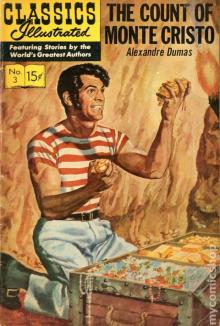 The Count of Monte Cristo, Illustrated
The Count of Monte Cristo, Illustrated Knight of Maison-Rouge
Knight of Maison-Rouge![The Three Musketeers - Alexandre Dumas - [Full Version] - (ANNOTATED) Read online](http://i1.bookreadfree.com/14/the_three_musketeers_-_alexandre_dumas_-_[full_version]_-_annotated_preview.jpg) The Three Musketeers - Alexandre Dumas - [Full Version] - (ANNOTATED)
The Three Musketeers - Alexandre Dumas - [Full Version] - (ANNOTATED) The Man in the Iron Mask
The Man in the Iron Mask The Count of Monte Cristo (Penguin Classics eBook)
The Count of Monte Cristo (Penguin Classics eBook) Count of Monte Cristo (abridged) (Barnes & Noble Classics Series)
Count of Monte Cristo (abridged) (Barnes & Noble Classics Series) The Women's War
The Women's War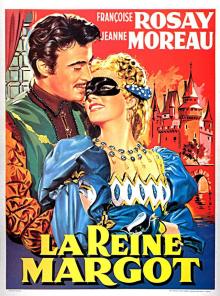 La reine Margot. English
La reine Margot. English The Vicomte de Bragelonne
The Vicomte de Bragelonne__english_preview.jpg) La dame aux camélias (Novel). English
La dame aux camélias (Novel). English The Count of Monte Cristo
The Count of Monte Cristo Balsamo, the Magician; or, The Memoirs of a Physician
Balsamo, the Magician; or, The Memoirs of a Physician Ten Years Later
Ten Years Later The Romance of Violette
The Romance of Violette The Mesmerist's Victim
The Mesmerist's Victim Vingt ans après. English
Vingt ans après. English Le collier de la reine. English
Le collier de la reine. English Taking the Bastile; Or, Pitou the Peasant
Taking the Bastile; Or, Pitou the Peasant The Hero of the People: A Historical Romance of Love, Liberty and Loyalty
The Hero of the People: A Historical Romance of Love, Liberty and Loyalty Louise de la Valliere
Louise de la Valliere Les Quarante-cinq. English
Les Quarante-cinq. English Ange Pitou (Volume 1)
Ange Pitou (Volume 1) The Royal Life Guard; or, the flight of the royal family.
The Royal Life Guard; or, the flight of the royal family. Les trois mousquetaires. English
Les trois mousquetaires. English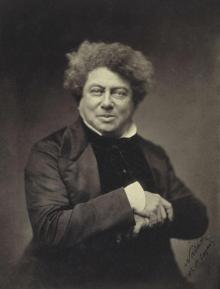 Une fille du régent. English
Une fille du régent. English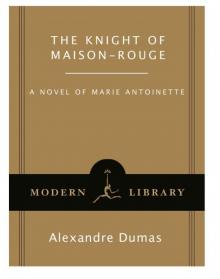 The Knight of Maison-Rouge
The Knight of Maison-Rouge The Count of Monte Cristo (Unabridged Penguin)
The Count of Monte Cristo (Unabridged Penguin) Ange Pitou
Ange Pitou The Romance of Violette (vintage erotica)
The Romance of Violette (vintage erotica) The Three Musketeers
The Three Musketeers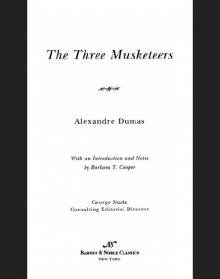 Three Musketeers (Barnes & Noble Classics Series)
Three Musketeers (Barnes & Noble Classics Series) Georges
Georges Man in the Iron Mask (Barnes & Noble Classics Series)
Man in the Iron Mask (Barnes & Noble Classics Series) The Red Sphinx
The Red Sphinx